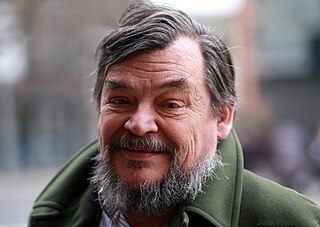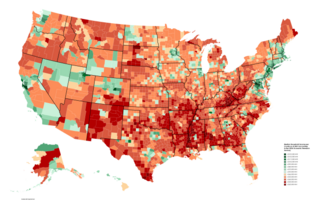Related Research Articles

Adam Smith was a Scottish economist and philosopher who was a pioneer in the thinking of political economy and key figure during the Scottish Enlightenment. Seen by some as "The Father of Economics" or "The Father of Capitalism", he wrote two classic works, The Theory of Moral Sentiments (1759) and An Inquiry into the Nature and Causes of the Wealth of Nations (1776). The latter, often abbreviated as The Wealth of Nations, is considered his magnum opus and the first modern work that treats economics as a comprehensive system and as an academic discipline. Smith refuses to explain the distribution of wealth and power in terms of God's will and instead appeals to natural, political, social, economic, legal, environmental and technological factors and the interactions among them. Among other economic theories, the work introduced Smith's idea of absolute advantage.

Corporatocracy is an economic, political and judicial system controlled by business corporations or corporate interests.

The Economist is a British weekly newspaper published in printed magazine format and digitally. It focuses on current affairs, international business, politics, technology, and culture. Based in London, the newspaper is owned by the Economist Group, with its core editorial offices in the United States, as well as across major cities in continental Europe, Asia, and the Middle East. The newspaper has a prominent focus on data journalism and interpretive analysis over original reporting, to both criticism and acclaim.
Crime statistics refer to systematic, quantitative results about crime, as opposed to crime news or anecdotes. Notably, crime statistics can be the result of two rather different processes:

Wealth is the abundance of valuable financial assets or physical possessions which can be converted into a form that can be used for transactions. This includes the core meaning as held in the originating Old English word weal, which is from an Indo-European word stem. The modern concept of wealth is of significance in all areas of economics, and clearly so for growth economics and development economics, yet the meaning of wealth is context-dependent. A person possessing a substantial net worth is known as wealthy. Net worth is defined as the current value of one's assets less liabilities.

Economic inequality is an umbrella term for a) income inequality or distribution of income, b) wealth inequality or distribution of wealth, and c) consumption inequality. Each of these can be measured between two or more nations, within a single nation, or between and within sub-populations.

Statistics New Zealand, branded as Stats NZ, is the public service department of New Zealand charged with the collection of statistics related to the economy, population and society of New Zealand. To this end, Stats NZ produces censuses and surveys.

Erik Steenfeldt Reinert is a Norwegian economist, with development economics, economic history and history of economic policy as his specialties.

Robert David Putnam is an American political scientist specializing in comparative politics. He is the Peter and Isabel Malkin Professor of Public Policy at the Harvard University John F. Kennedy School of Government.

Eurostat is a Directorate-General of the European Commission located in the Kirchberg quarter of Luxembourg City, Luxembourg. Eurostat's main responsibilities are to provide statistical information to the institutions of the European Union (EU) and to promote the harmonisation of statistical methods across its member states and candidates for accession as well as EFTA countries. The organisations in the different countries that cooperate with Eurostat are summarised under the concept of the European Statistical System.

High-net-worth individual (HNWI) is a technical term used in the financial services industry to designate individuals who maintain liquid assets at or above a certain threshold. Typically, these individuals are defined as holding financial assets valued over US$1 million. A secondary level, a very-high-net-worth individual (VHNWI), references an individual with a net worth of at least US$5 million. The terminal level, an ultra-high-net-worthindividual (UHNWI) holds US$30 million in investible assets. Individuals with a net worth of over US$1 billion are considered to occupy a special bracket of the UHNW. These thresholds are broadly used in studies of wealth inequality, government regulation, investment suitability requirements, marketing, financing standards, and general corporate strategy.
The System of National Accounts is an international standard system of national accounts, the first international standard being published in 1953. Handbooks have been released for the 1968 revision, the 1993 revision, and the 2008 revision. The System of National Accounts, in its various released versions, frequently with significant local adaptations, has been adopted by many nations. It continues to evolve and is maintained by the United Nations, the International Monetary Fund, the World Bank, the Organisation for Economic Co-operation and Development, and Eurostat.

An online newspaper is the online version of a newspaper, either as a stand-alone publication or as the online version of a printed periodical.

Affluence refers to an individual's or household's economical and financial advantage in comparison to others. It may be assessed through either income or wealth.
Sir Harry Campion, KCB, CBE was a British statistician and the first director of what was the Central Statistical Office of the United Kingdom. He was also first director of the United Nations Statistical Office. He played a leading role in the development of official statistics, nationally and internationally, after the Second World War.
Understanding Society, the UK Household Longitudinal Study (UKHLS), is one of the largest panel survey in the world, supporting social and economic research. Its sample size is 40,000 households from the United Kingdom or approximately 100,000 individuals.

Thomas Piketty is a French economist who is a professor of economics at the School for Advanced Studies in the Social Sciences, associate chair at the Paris School of Economics and Centennial Professor of Economics in the International Inequalities Institute at the London School of Economics.

Danny Dorling is a British social geographer. Since 2013, he has been Halford Mackinder Professor of Geography of the School of Geography and the Environment of the University of Oxford.

Capital: A Critique of Political Economy, also known as Capital, is a foundational theoretical text in materialist philosophy and critique of political economy written by Karl Marx, published as three volumes in 1867, 1885, and 1894. The culmination of his life's work, the text contains Marx's analysis of capitalism, to which he sought to apply his theory of historical materialism "to lay bare the economic law of motion of modern society", following from classical political economists such as Adam Smith and David Ricardo. The text's second and third volumes were completed from Marx's notes after his death and published by his colleague Friedrich Engels. Das Kapital is the most cited book in the social sciences published before 1950.
Muriel Nissel was a British statistician and civil servant. Together with Claus Moser, she created "a national survey analysing trends in social welfare", that was to become Social Trends, first published in 1970, and considered to be the "statistician's bible", before working on the "distribution and redistribution of wealth". Nissel also wrote well-regarded books, including People Count – a history of the General Register Office, and Married to the Amadeus: Life with a String Quartet.
References
- 1 2 Bindel, Julie (28 November 2010). "Muriel Nissel obituary". The Guardian. Retrieved 26 November 2017– via www.theguardian.com.
- ↑ "How politics put paid to the ONS review of social trends". Financial Times. 2019-01-02. Retrieved 2019-07-21.